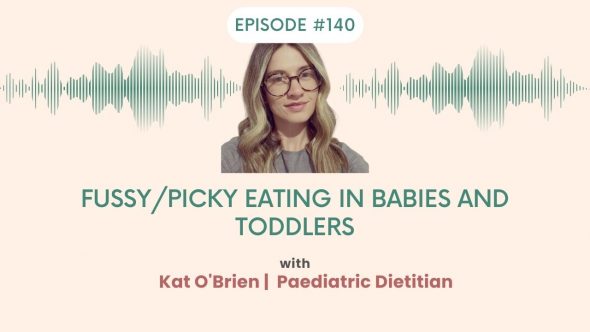DISCLAIMER:
Please note that this transcription was completed with computer voice recognition software. Quite often unanticipated grammatical, syntax, homophones, and other interpretive errors are inadvertently transcribed by the computer software. Please disregard these errors. Please excuse any errors that have escaped final proofreading.
What is normal and what is not normal, when it comes to fussy / picky eating?
There are a few different guides or ideas around this here is a bit more of a structured definition, which can sometimes help to give parents more peace of mind.
Picky Eaters:
- A picky eater is someone who might eat about 30 foods.
- They might go off a type of food, but if you take it out of their diet, and then reintroduce it in a couple of weeks, they will usually re-accept it, so they you can get a food type back into their diet.
- They will eat at least one food from all or most food groups. So they might all be beige, but they’re eating from every food group. You might be able to have a new food on their plate, and they’re not going to get upset. They may not eat it, but they might pick it up.
- They’re selective but they eat it most mealtimes if they’re hungry
Problem Feeders (that may need more support):
- Might eat less than 20 foods
- Kids might food jag, which means that when they get sick of a food that they really like you cannot reintroduce it into their diet.
- So that list of accepted foods is just dwindling and getting smaller and smaller.
- They refuse entire food groups. So they’re at risk of nutritional deficiencies. So for these kids, we often see them not getting enough calcium or enough iron.
- And they often need to have different meals to everyone else in the family. And if you put a food that they aren’t comfortable with on a plate, there can be an entire meltdown or tantrum, and so much discomfort for them that can completely derail the entire meal time for everybody.
- And it tends to persist for a really long time, like not weeks or months, but years.
- So these are the kids that might needs more of the one on one specialist intervention from feeding specialists.
What about a tantrum that happens if their favourite meal isn’t served up?
If there is a tantrum as a result of not having their favourite meal on the plate, it is important to consider if is this a tired kid who’s had a really long day who wanted a particular food and it’s actually not about the meal. Meaning, often meal time happens at the end of a long day for a toddler, or perhaps your child has been at childcare or school, and they’ve had to hold in all of those feelings and be on their best behaviour in the classrooms and follow rules. Then they get home and it’s a safe place where they can have these big kind of meltdowns and let those feelings out. And the dinner table can be a place that that often happens.
So is it more about what else is going on? Or is that child trying to exert their autonomy and control which is really normal? Or is this more like a recurrent issue where mealtimes are incredibly anxiety provoking? And there’s some fear and anxiety around food for your kid?
Parents are pretty good at knowing the difference between picky eaters and problem feeding.
So, if it’s every now and then the mealtime tantrums are happening at the end of the day, then this is a very different situation to problem feeding and extreme picky eating.
Take home message?
One of the biggest takeaway messages, is that if you are worried about your child, if you’re stressed and mealtimes feel like a battle or a struggle, and you’re dreading meal-times, then we need to change that dynamic. We need to change things so that feeding kids is not stressful for you. So be sure to seek help if you need, as often in one session there can be a big difference made.
Tips for fussy eating in babies and toddlers
For fussy eating, a lot of parents get into this trap of thinking, ‘My child has to eat and they need to be eating’. And so parents might start offering another meal, or leaning really heavily on things like food pouches or particular textures, or like letting them run around at mealtimes, because parents just think ‘my kids has to eat’.
And we can kind of get into this cycle of doing things to help our kid eat in that moment, which might actually compound the issue.
So there’s lots of things we can do, if you have a developmentally normal, to help them and help ourselves through that.
So let’s chat through the fussy eating periods.
Babies start solids, six to 12 months, we have this golden period where kids are usually pretty gung ho and excited to eat anything. You can put liver in front of them, and they’re just like, oh, cool, I’ll give this a go!
So this is a golden period, where it’s really about offering variety and getting them used to a wide variety of things.
And then we hit this period between 12 and 14 months, where they develop a real awareness about flavour and perception at this time, their growth is also slowing, their nutrition needs slowing down as well. They tend to become a bit more selective, have less appetite, want to eat less, and they are developing preference in their own voice.
So this is kind of that first tricky, fussy eating period that parents can kind of fall into this trap. They think ‘they have to be eating’ because you’ve been told from a very young age, or they’re having enough milk, how much weight are they gaining, and such a hyper focus on growth that parents carry that through, rather than going well, maybe my child and this is like 12 to 14 months.
First thing I look at is, how much milk are they having over the day if they’re not breastfed if they’re drinking milk from a cup or bottle or their formula fit and trying to keep that to 400 mls after 12 months, because milk can displace appetite, fill them up their little tummies up quickly.
It can also increase risk of anaemia as well, calcium interferes with iron absorption and being anaemic can also cause a loss of appetite as well.
- Consider milk consumption
- Increase appetite by considering time between snacks and meals
- Implement boundaries at this age around eating in their high chair. Being firm around communicating with them ‘if you’re finished eating the meal is done’.
- Consider childhood illness and teething that disrupts eating as well.
- So at this age, and for all ages, but certainly at this age, parents really need to try and let go of some of that control and trust their little ones appetite, kids are incredibly good at regulating how much they need to be eating to meet their needs.
- And they’re gonna have days where they eat everything, and then they eat nothing. And that’s okay, as long as they’re gaining weight and growing well, and there’s no concerns, then we can trust that they’re getting what they need.
So setting boundaries, not letting them graze, look at their milk consumption, and trusting them are key components / cornerstones for 12-14 months.
18-36 months fussy feeding.
At this stage they’re really developing opinion and self awareness at this age. And we get another real leap of fussiness.
Division of Responsibility
Parents are in charge of what’s on offer. And children are in charge of how much to eat.
So that’s a really big thing. It’s not our job to make our kids eat, we need to trust that they know what their bodies need, and that they’re getting enough.
There’s a lot of research to show us that it’s true that kids know their appetite, and their appetite is enough to fuel their bodies for most kids. So if they’re growing well, we don’t need to constantly be offering and pressuring them to eat when you press your children to eat if it backfires. They hate pressure. They like control and autonomy. If we are pressuring then (even when we don’t think they are) with the ‘your sister’s having some broccoli and carrots, do you want to try them?’
Or ‘you can have some dessert if you eat, finish your dinner’.
That’s us, putting pressure on them.
So try to take the pressure off, like what they’re eating is just like to be the least thing that you focus on.
Mealtimes are time for connection and chatting and bonding. It’s not about watching or talking about food unless it’s child led.





